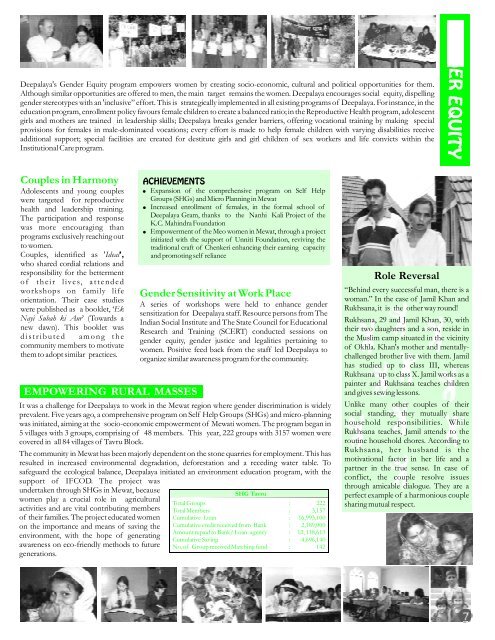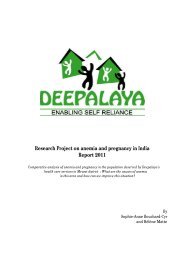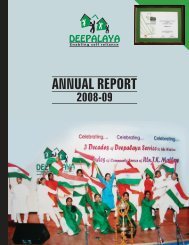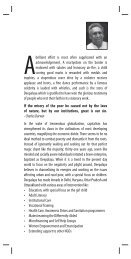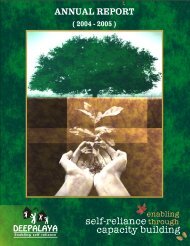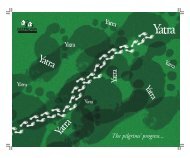Deepalaya Annual Report 2003-2004 (3.79 MB)
Deepalaya Annual Report 2003-2004 (3.79 MB)
Deepalaya Annual Report 2003-2004 (3.79 MB)
Create successful ePaper yourself
Turn your PDF publications into a flip-book with our unique Google optimized e-Paper software.
<strong>Deepalaya</strong>'s Gender Equity program empowers women by creating socio-economic, cultural and political opportunities for them.<br />
Although similar opportunities are offered to men, the main target remains the women. <strong>Deepalaya</strong> encourages social equity, dispelling<br />
gender stereotypes with an 'inclusive” effort. This is strategically implemented in all existing programs of <strong>Deepalaya</strong>. For instance, in the<br />
education program, enrollment policy favours female children to create a balanced ratio; in the Reproductive Health program, adolescent<br />
girls and mothers are trained in leadership skills; <strong>Deepalaya</strong> breaks gender barriers, offering vocational training by making special<br />
provisions for females in male-dominated vocations; every effort is made to help female children with varying disabilities receive<br />
additional support; special facilities are created for destitute girls and girl children of sex workers and life convicts within the<br />
Institutional Care program.<br />
Couples in Harmony<br />
Adolescents and young couples<br />
were targeted for reproductive<br />
health and leadership training.<br />
The participation and response<br />
was more encouraging than<br />
programs exclusively reaching out<br />
to women.<br />
Couples, identified as ' Ideal',<br />
who shared cordial relations and<br />
responsibility for the betterment<br />
o f t h ei r l ive s, a tt e nde d<br />
workshops on family life<br />
orientation. Their case studies<br />
were published as a booklet, ‘ Ek<br />
Nayi Subah ki Aur’ (Towards a<br />
new dawn). This booklet was<br />
di st r i b u te d am o n g t h e<br />
community members to motivate<br />
them to adopt similar practices.<br />
EMPOWERING RURAL MASSES<br />
ACHIEVEMENTS<br />
Expansion of the comprehensive program on Self Help<br />
Groups (SHGs) and Micro Planning in Mewat<br />
Increased enrollment of females, in the formal school of<br />
<strong>Deepalaya</strong> Gram, thanks to the Nanhi Kali Project of the<br />
K.C. MahindraFoundation<br />
Empowerment of the Meo women in Mewat, through a project<br />
initiated with the support of Unniti Foundation, reviving the<br />
traditional craft of Chenkeri enhancing their earning capacity<br />
and promoting self reliance<br />
Gender Sensitivity at Work Place<br />
A series of workshops were held to enhance gender<br />
sensitization for <strong>Deepalaya</strong> staff. Resource persons from The<br />
Indian Social Institute and The State Council for Educational<br />
Research and Training (SCERT) conducted sessions on<br />
gender equity, gender justice and legalities pertaining to<br />
women. Positive feed back from the staff led <strong>Deepalaya</strong> to<br />
organize similar awareness program for the community.<br />
It was a challenge for <strong>Deepalaya</strong> to work in the Mewat region where gender discrimination is widely<br />
prevalent. Five years ago, a comprehensive program on Self Help Groups (SHGs) and micro-planning<br />
was initiated, aiming at the socio-economic empowerment of Mewati women. The program began in<br />
5 villages with 3 groups, comprising of 48 members. This year, 222 groups with 3157 women were<br />
covered in all 84 villages of Tavru Block.<br />
The community in Mewat has been majorly dependent on the stone quarries for employment. This has<br />
resulted in increased environmental degradation, deforestation and a receding water table. To<br />
safeguard the ecological balance, <strong>Deepalaya</strong> initiated an environment education program, with the<br />
support of IFCOD. The project was<br />
undertaken through SHGs in Mewat, because<br />
women play a crucial role in agricultural<br />
activities and are vital contributing members<br />
of their families. The project educated women<br />
on the importance and means of saving the<br />
environment, with the hope of generating<br />
awareness on eco-friendly methods to future<br />
generations.<br />
SHG Tavru<br />
Total Groups : 222<br />
Total Members : 3,157<br />
Cumulative Loan : 16,993,100<br />
Cumulative credit received from Bank : 2,189,000<br />
Amount repaid to Bank/ Loan agency : 12, 118,613<br />
Cumulative Saving : 4,696,140<br />
No. of Group received Matching fund : 142<br />
Role Reversal<br />
“Behind every successful man, there is a<br />
woman.” In the case of Jamil Khan and<br />
Rukhsana, it is the other way round!<br />
Rukhsana, 29 and Jamil Khan, 30, with<br />
their two daughters and a son, reside in<br />
the Muslim camp situated in the vicinity<br />
of Okhla. Khan's mother and mentallychallenged<br />
brother live with them. Jamil<br />
has studied up to class III, whereas<br />
Rukhsana up to class X. Jamil works as a<br />
painter and Rukhsana teaches children<br />
and gives sewing lessons.<br />
Unlike many other couples of their<br />
social standing, they mutually share<br />
household responsibilities. While<br />
Rukhsana teaches, Jamil attends to the<br />
routine household chores. According to<br />
Rukhsana, her husband is the<br />
motivational factor in her life and a<br />
partner in the true sense. In case of<br />
conflict, the couple resolve issues<br />
through amicable dialogue. They are a<br />
perfect example of a harmonious couple<br />
sharing mutual respect.


